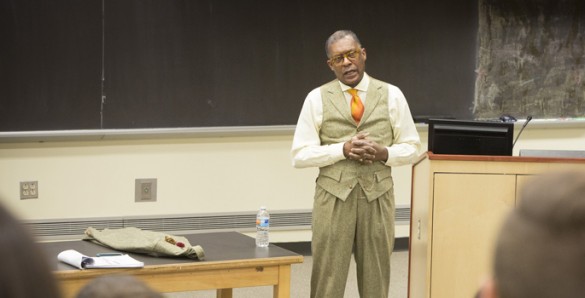
The number of black students applying to medical schools across the country is decreasing. Of particular concern is the reduced number of black males going into medicine. Vanderbilt University School of Medicine wants to change that trend.
VUSM recently held a town hall meeting to inform the medical students currently enrolled about continued plans to address the issue. The town hall was in response to a series of smaller lunch meetings that included various deans from VUSM and a rotating body of students.
It is expected that monthly public forums will continue on various issues.
“Students have voiced concern about what we are doing about diversity, inclusion and health care disparities,” said Bonnie Miller, M.D., associate vice chancellor for Health Affairs and senior associate dean for Health Sciences Education.
“The topic is urgently important and we want our students to know that we are confronting this issue head on. The larger endeavor is to try to open up as many lines of communication with our students as possible. Our students have a critically important perspective and we need to hear from them.”
A year ago representatives from VUSM created the African-American/Disadvantaged Student Pipeline Program Development and Assessment Task Force (AADPT). The group, consisting of students, faculty and administrators, developed short-term and long-term solutions to address the declining numbers of black males and disadvantaged students applying to medical schools. Three priorities were created — immediate, proximal and distal.
Miller said the AADPT hopes to assist with a national issue — all medical schools competing for a small pool of “very talented, African-American applicants.”
“We want to maintain our own diversity, but also look at long-term plans that will make an impact on our communities and be a part of the solution for all medical schools across the country,” said André Churchwell, M.D., senior associate dean for Diversity Affairs.
“Students from diverse backgrounds enhance the learning environment for all of our students,” he said. “Their life experiences offer them insights into medical problems that require culture sensitivity and competency that adds to the intellectual richness of the medical student experience.”
One initiative involves partnerships with Historically Black Colleges and Universities (HBCUs) including Fisk University, Morehouse College and Spellman College to increase the number of students from those institutions applying to and entering Vanderbilt. The program also includes Berea College in Kentucky, a school committed to providing a college education to all disadvantaged students. The goal is to accept one undergraduate student from each institution every year into a summer enrichment program that would provide research and clinical experiences and would prepare them for them the medical school application process.
“This would expose these students to a top 15 U.S. News and World Report research medical school that is committed to creating leaders as well as creating a path for African-American and disadvantaged students to directly enter VUSM, supporting our mission for broad diversity,” Churchwell said.
The pipeline would also target students from lower income groups and would forge relationships with colleges with a higher ratio of economically disadvantaged students with a goal of connecting more learners to science, math and medical-focused opportunities.
Other AADPT directives include strengthening enhancement programs for middle and high school students in the Middle Tennessee area in an effort to increase interest in medicine.
“We are currently involved in several programs locally, but we would like to dig deeper and have a much greater impact with our outreach and mentoring projects,” said Miller.
One student who attended the town hall was pleasantly surprised by the discussion, interest in growing the minority student population and the efforts in designing strategies to affect local young minds.
He felt the open forum was the perfect venue for next steps.
“As long as the conversation is consistent and transparent from month to month, and all students are forced to contend with these challenges, then our environment will prove to be enriching and flexible enough to adjust to the fluctuating nature of the medical student experience,” said Sir Norman Melancon, a second-year medical student.
“These are the types of issues that need institutional support and structure,” he said. “Diversity, inclusion and social change are not extracurricular in life experience, so they should not be extracurricular in the medical training environment.”
The next town hall will highlight the clinical learning environment, a topic of national interest.












